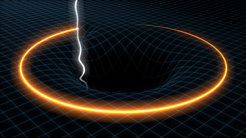Europe ready to enter next phase of the Square Kilometre Array
New SKA project office and European Centres for Science & Technology of the international radio telescope project

The SKA is a €1.5 billion multinational science project to build the world's largest and most sensitive radio telescope. The SKA will be capable of answering some of the most fundamental questions about the Universe. To realise this, breakthroughs in technology are required that will benefit society and economy beyond the scientific application.
The SPO, which is expected to grow to 60 people over the next four years, will supersede the existing SKA Program Development Office (SPDO) currently based at the University of Manchester. The SPO will be based at an internationally recognised radio observatory and will be a state-of-the-art building, fully equipped to support the needs of a growing international project.Professor Richard Schilizzi, Director of the SKA, says: "The move to Jodrell Bank comes at a crucial time for the project as we move from development programme to international megascience project. The new location and facilities will support the significant expansion that is planned."
Europe is strongly represented in the SKA project, with major SKA pathfinder projects (LOFAR, e-Merlin, APERTIF and e-VLBI) and technological innovations. European scientists, organised in the European SKA Consortium (ESKAC) decided to strengthen the global activities for SKA.
"The SKA represents a quantum leap for European Science: from the origin of the Universe to the observation of the most energetic particles in space it promises novel answers in some of the most fundamental areas of modern science", says Professor Heino Falcke (Radboud-Universität Nijmegen, ASTRON & MPIfR). "European scientists and engineers are working at the cutting edge, not least driven by precursor projects like the low-frequency radio telescope LOFAR."
The further preparation of the exciting SKA science will be coordinated by a SKA Science Office in Bonn, Germany, where the Max-Planck-Institute for Radio Astronomy and the University of Bonn bring together national and European activities to coordinate them with the SPO at Jodrell Bank.
"We are very pleased about this progress in the SKA project", says Professor Michael Kramer, Director at the Max Planck Institute for Radio Astronomy in Bonn. "This telescope will not only be a superb instrument in uniquely advancing our own research, namely the understanding of fundamental forces in nature like gravity and magnetism, but it represents an amazing observatory for the German, European and indeed global science community."

"The settling of an European Science Office in Bonn further enhances the role of Bonn as a science centre", adds Professor Frank Bertoldi from the Argelander-Institut für Astronomie of Bonn University. "The goal is to provide organisation and support for the strongly increasing radioastronomical science community in Germany and Europe."
The SKA telescope itself will be located in either Australia-New Zealand or Southern Africa. A decision on the location of the SKA telescope will be made in 2012.

